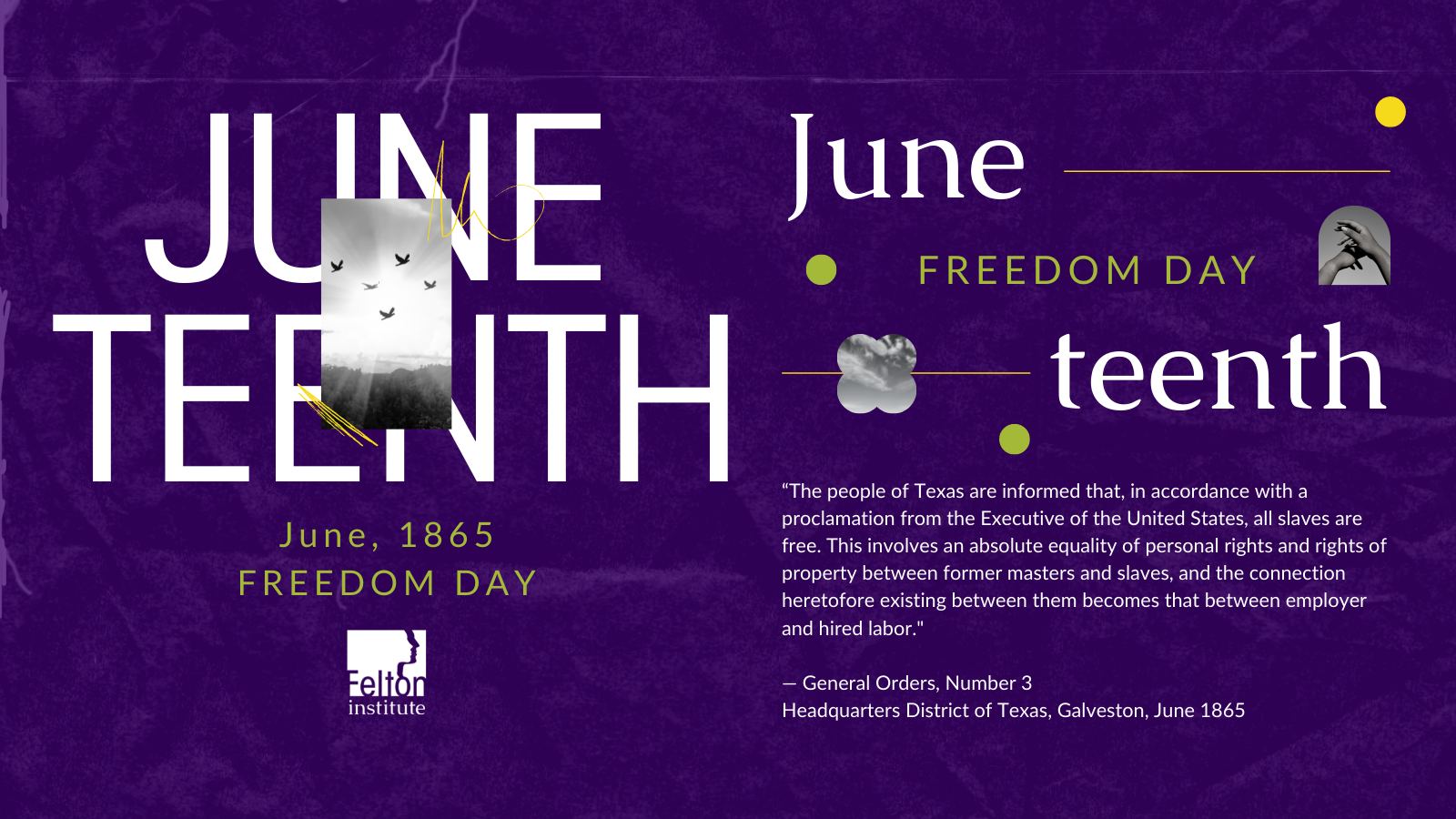Juneteenth, the nation’s oldest commemoration marking the end of slavery, is a day of reflection and celebration. Also known as Emancipation Day, Jubilee Day, and Freedom Day, it was first observed over one hundred and fifty years ago and just last year declared a federal holiday. It’s a time to honor and educate one another about the struggles and triumphs of Black people in the fight for racial justice. Felton Institute honors this holiday while promoting and supporting programs and evidence-based research in the pursuit of racial equity and social justice. In furthering these ideals, we explored the history of this important national holiday.

Juneteenth, a combination of June and 19, marks the day in 1865 that Union General Gordon Granger informed enslaved Blacks in Galveston, Texas that slavery had been abolished. The General’s official proclamation read in part:
“The people of Texas are informed that, in accordance with a proclamation from the Executive of the United States, all slaves are free. This involves an absolute equality of personal rights and rights of property between former masters and slaves, and the connection heretofore existing between them becomes that between employer and hired labor.” General Orders, Number 3; Headquarters District of Texas, Galveston, June 19, 1865.
The announcement came nearly two and a half years after President Abraham Lincoln issued his Emancipation Proclamation freeing all slaves. After his edict, slave owners fled to the Confederate state of Texas bringing with them over 200,000 slaves. It wasn’t until Union soldiers arrived two months after the Civil War had ended that slavery was finally abolished in the Southern state.
The end of over 400 years of human bondage brought jubilation across the land. In an interview with 93-year-old former Texas slave Felix Haywood with The Federal Writer’s Project in the 1930s, he described the feeling of freedom as, “walkin’ on golden clouds.” He continued, “We all felt like heroes, and nobody made us that way but ourselves. We was free.”
The first Juneteenth commemoration took place in Texas in 1866, a year after the end of the Civil War. In the early years of the holiday, there were live readings of the Emancipation Proclamation, religious sermons, and registering Black men to vote. Since that time, Juneteenth has extended across the nation, interweaving the fight for racial justice with honoring the ancestors who came before.
Black southerners migrated across the United States bringing with them the stories and celebrations of their ancestors. From the 1910s until the 1970s, approximately six million Black people moved from the South to the Western, Northern, and Midwest regions of the country in what was to be known as The Great Migration. They established Juneteenth commemorations in cities such as Oakland, Seattle, and Los Angeles. During the Civil rights era in 1960, Black student activists in Atlanta wore Juneteenth Freedom buttons. And after Martin Luther King Jr’s assassination, activists brought his vision of the Poor People’s Campaign to Washington DC, on June 19th, 1968. In the present day, the fight for racial justice drew attention to making Juneteenth a federal holiday.
Texas was the first state to recognize Juneteenth as a state holiday in 1980. Since that time numerous states have commemorated Juneteenth and celebrations are held in cities across the country featuring parades, concerts, art exhibits, educational events, and even a Miss Juneteenth Pageant in Tennessee, Florida, and Texas. This holiday would soon be recognized on a national scale.
The Black Lives Matter movement, coupled with national outrage and protests surrounding George Floyd’s murder in 2020 by a Minneapolis police officer, were driving force’s in shining a light on racial justice. These social justice movements also brought Juneteenth into the national consciousness and advocated making it into a federal holiday. By doing so, a national holiday would have the power to honor and educate the nation about Black history. This became a reality on June 17, 2021, when President Joe Biden signed legislation declaring Juneteenth a federal holiday. It’s the first national holiday since Martin Luther King Day was declared in 1983. Biden said of the event that it “would go down as one of the greatest honors I will have as president.”
Another driving force behind recognizing Juneteenth as a federal holiday was 95-year-old Texan Opal Lee, known as the ‘Grandmother of Juneteenth’, who spent decades advocating to make it a federal holiday. She was honored at President Biden’s signing ceremony and explained that Juneteenth is “not a Texas thing or a Black thing. It’s an American thing.” She stressed in an interview with the Fort Worth Star-Telegram, that she wants to “make people understand that Juneteenth is not a festival.” She explains, “it should be a unifier.”
Juneteenth is a day to honor Black history and reflect on freedom and the challenges to freedom. It’s also a time to celebrate and educate the nation about the lived experiences of Black people. Celebrating Juneteenth, Felton Institute remains committed to racial and social justice.

About Felton Institute: Rooted in equity, Felton Institute transforms quality of life and promotes social justice to accelerate community led change. Felton Institute is a tax-exempt organization registered 501(c)(3) nonprofit under EIN 94-1156530.
Offering more than 50 acclaimed and honored programs that address homelessness, mental health, prenatal, adolescent, adult and senior needs, Felton Institute provides evidence-based behavioral health and social services in San Francisco, Alameda, San Mateo, Marin, and Monterey counties.
Felton Institute can trace its roots back to 1889. The organization is named for its social services pioneer and executive director Dr. Katharine “Kitty” Felton who was called the “conscience of San Francisco” and was committed to ensuring that children and families in crisis have access to social services and resources in order to help them build upon their inherent strengths and develop self-sufficiency. www.felton.org